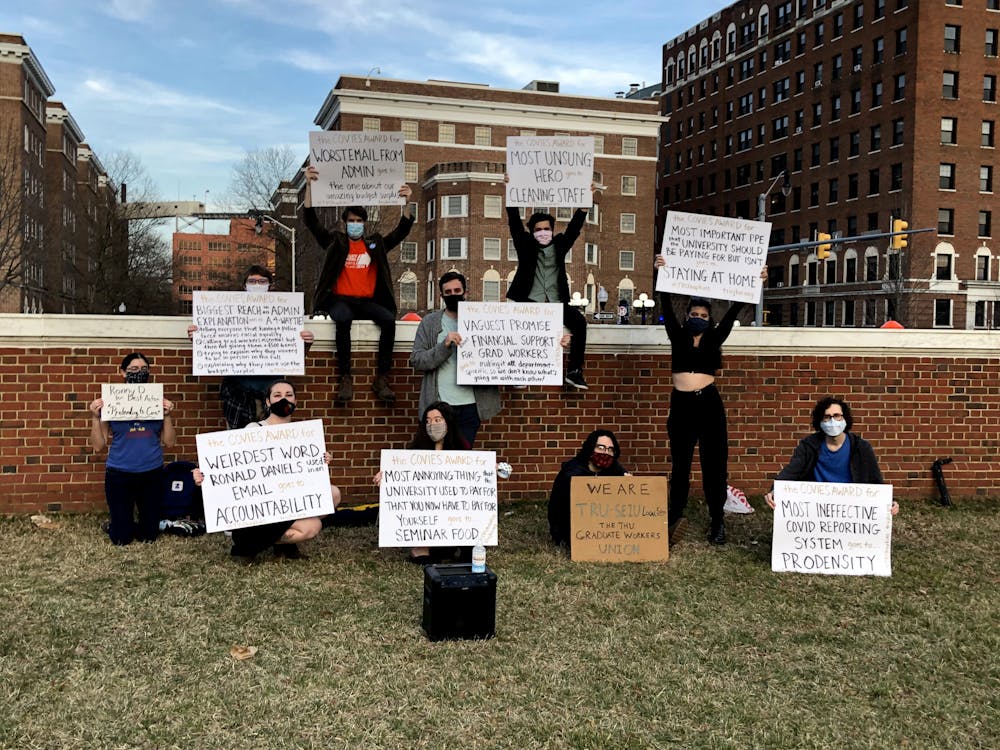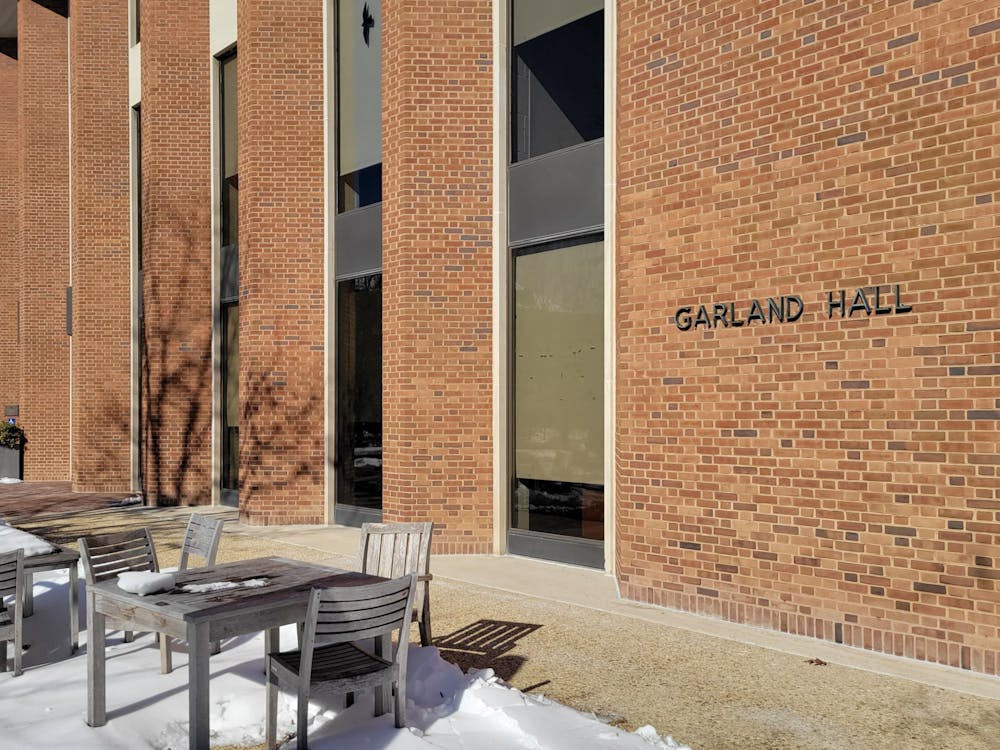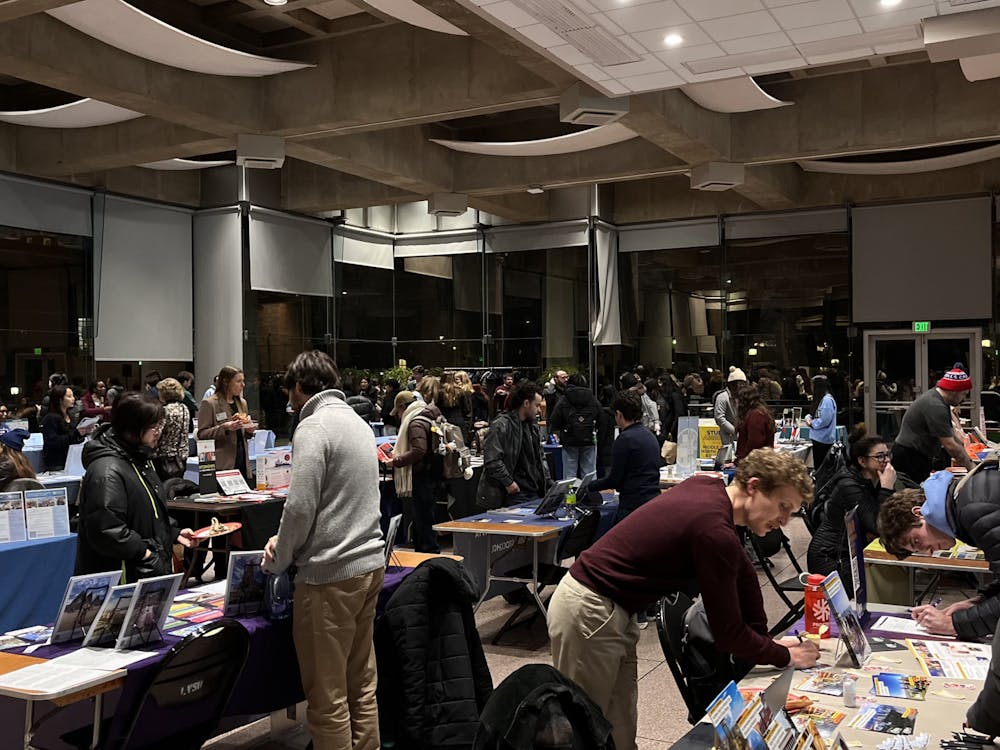Teachers and Researchers United (TRU), an unofficial graduate student union, held a socially distanced protest in the form of a satirical awards show on March 10 at the Beach to mark the one-year anniversary of the University’s COVID-19 shutdown. At the protest, called the “Covies,” TRU accused the University’s leadership of failing to protect and support graduate students.
The event came after TRU held a rally and caravan last December and sent numerous petitions to the University seeking funding extensions and additional health-care support.
Different graduate students swapped off to announce categories, nominations and winners of each award. Some categories included “Most Ineffective COVID Reporting System” and “Vaguest Promise for Graduate Workers.” “Prodensity” and “Making it all department-specific so we don’t know what’s going on” won these awards, respectively.
Fifth-year PhD student Peter Weck, a member of TRU’s Organizing Committee, explained that satire seemed to be the most appropriate type of protest given the timing of the event on the one-year anniversary of COVID-19.
“Graduate students have been through a lot in this past year. We've been lied to a lot and haven't been treated with the greatest amount of respect by the University,“ he said. “Something a bit more lighthearted where we could all come together and remind each other that we're not alone and have a good laugh was in order.”
First-year PhD student Alexander Peeples, another member of TRU’s Organizing Committee, explained that the satire of the Covies reflected the administration’s desire for praise in an email to The News-Letter.
“It seems the only way to get the administration's attention is with rankings or awards. It was nice to share a laugh when Hopkins seems so intent on pushing us to despair with its negligence,” they wrote. “The absurdity of the event matched the absurdity of Hopkins' comically poor response to the pandemic.”
TRU posted a public form on its social media pages a week prior to the event to tally the votes for each nomination.
In an email to The News-Letter, Oz Amram, a fifth-year PhD student in the Physics & Astronomy Department, described what he thought was the most memorable moment from the event.
“It was a little strange when ‘Fraternities’ won the least socially distanced award, and some undergrads on the beach in attendance who were possibly in fraternities cheered and then took pictures of the award after,” he wrote.
Weck explained that the administration has refused to engage with TRU on the organization’s terms.
“In December, we laid out some ways in which we believe the University could do better,” he said. “The vice provost reached out to us, gave a rebuttal and offered to talk to us. We tried to take them up on that. We set up a forum communication with the vice provost office, and they refused to attend.”
Peeples further elaborated their thoughts on the University’s response to TRU.
“The administration seems actively committed to not hearing the voices of graduate workers,” they wrote. “I have to assume they heard about the awards and wanted to make sure that ‘accountability’ won ‘weirdest word Ronald Daniels used in an email.’”
In an email to The News-Letter, Karen Lancaster, the assistant vice president of external relations for the Office of Communications, stated that the University appreciates hearing from graduate students.
“Leaders will continue to meet with the formal graduate student representative organizations to discuss graduate student matters and meet with students individually about issues of concern to them,” she wrote.
On March 12, the National Labor Relations Bureau (NLRB), an independent federal agency enforcing the National Labor Relations Act, dropped the proposed rule that would prohibit graduate workers at private schools from collective bargaining. This grants TRU eligibility for an election through NLRB.
Peeples commented that the NLRB’s announcement confirmed TRU’s arguments.
“The recent NLRB ruling is a reminder that graduate workers are workers full stop. Hopefully, that's a lesson Hopkins chooses to learn soon,” they wrote.
Although TRU is now eligible to apply to be an official union, Weck explained why TRU is still waiting to file for an election.
“TRU hasn’t previously and still isn’t immediately planning to file for a union vote with the NLRB, even though we plan to eventually win recognition,” he said. “Republicans still have a majority on the NLRB board, so no new grad elections seem likely to be approved until Biden gets the chance to appoint new members to that body.”
According to Weck, the Hopkins Faculty Association recently passed a motion to support one of TRU’s central demands for a universal one-year funding and insurance extension.
In light of both announcements, Weck expressed optimism for the future of TRU.
“We're very excited to have explicit faculty support and endorsement for this demand. We're hopeful that as we build this bigger coalition across the campus that we can win some of these things,” he said.
He called on undergraduates to support their actions as well.
“To win full union recognition and improved working conditions, we need faculty, staff and solidarity from undergraduates as well,” he said. “We'd love to have undergraduates at our events, signatures on the petitions and letters that we put out, and they can join our mailing list at trujhu.org.”
Michelle Limpe contributed reporting to this article.





